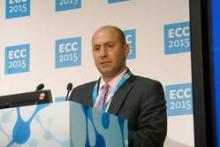VIENNA – The immune checkpoint inhibitor nivolumab extended overall survival by 5.4 months compared with standard therapy in patients with advanced kidney cancer in the phase III CheckMate 025 trial.
The primary end point of median overall survival was 25 months with nivolumab (Opdivo) and 19.6 months with everolimus (Afinitor), representing a 27% reduction in the risk of all-cause death (Hazard Ratio for death, 0.73; P = .0018).
The survival benefit with the programmed death 1 (PD-1) inhibitor was seen irrespective of tumor PD-1 ligand 1 (PD-L1) expression, sex, or age and was accompanied by more objective responses and fewer serious side effects than everolimus.
“The survival improvement and favorable safety profile demonstrated in this phase III trial provides evidence for nivolumab as a potential new treatment option for previously treated patients with metastatic renal cell carcinoma (RCC),” study author Dr. Padmanee Sharma, of the University of Texas MD Anderson Cancer Center in Houston, said during a press briefing at the European Cancer Congress. The results were also simultaneously published in the New England Journal of Medicine (DOI:10.1056/NEJMoa1510665).
This is the only phase III trial to demonstrate a survival advantage in previously treated patients with metastatic RCC versus standard therapy, she said.
Based on the positive results, the trial was stopped early and nivolumab was recently granted breakthrough therapy designation from the Food and Drug Administration for advanced RCC.
CheckMate 025 randomly assigned 821 patients with advanced clear-cell RCC to 3 mg/kg nivolumab intravenously every 2 weeks or 10 mg everolimus orally once-daily until progression or intolerable toxicity. After the trial was halted, patients taking everolimus were allowed to cross over to nivolumab. Their median age was 62 years, 75% were male, and 72% of patients had received at least one prior antiangiogenic regimen for advanced disease.
Patients on nivolumab had a significantly better objective response rate than with everolimus (25% vs. 5%; odds ratio, 5.98; P <.001), including partial responses in 24% vs. 5% and complete responses in 4 patients vs. 2 patients (1% vs. < 1%).
Median progression-free survival was similar at 4.6 months with nivolumab and 4.4 months with everolimus (HR, 0.88; P= .11).
Dr. Sharma defended the 5.6-month gain in overall survival, cautioning that immune checkpoint therapies have the potential for durable responses that can last years and that the minimum follow-up in the trial was only 14 months.
It is unclear how long patients with RCC could anticipate remaining on nivolumab immunotherapy, although nivolumab is approved in melanoma and lung cancer until disease progression or toxicity and various dosing schedules are being explored, she said.
The median duration of treatment in the trial was 5.5 months (range < .01 to 29.6 months) with nivolumab and 3.7 months (range 0.2 to 25.7 months) with everolimus.
Invited discussant Dr. Cora Sternberg, of San Camillo and Forlanini Hospitals in Rome, said, “The overall survival of 25 months sets a new benchmark for patients with previously treated metastatic renal cell carcinoma.”
The results, however, pertain only to patients treated with antiangiogenic agents and the fate of patients with sarcomatoid elements is also unknown because the trial required only a clear-cell component, she added.
It is unclear why the PD-L1 biomarker was negative for overall survival, Dr. Sternberg said, adding that standardization of PD-L1 testing is urgently needed.
Grade 3/4 treatment-related adverse events in CheckMate 025 occurred in 19% of patients taking nivolumab and 37% taking everolimus, most commonly fatigue in 10 patients with nivolumab and anemia in 31 patients with everolimus. There were no treatment-related deaths in the nivolumab arm and two (one from septic shock and one from bowel ischemia) in the everolimus group, Dr. Sharma said.
The most common adverse events of any grade were fatigue (33%), nausea (14%), and pruritus (14%) for nivolumab and fatigue (34%), stomatitis (29%), and anemia (24%) for everolimus.
METEOR
Positive results from METEOR, another late-breaking phase III trial reported in the presidential session and simultaneously published in the New England Journal of Medicine (DOI:10.1056/NEJMoa1510016), are also likely to reshape treatment for advanced RCC.
Cabozantinib (Cometriq) reduced the risk of progression or death by 42% compared with everolimus in 650 patients with RCC who had progressed after vascular endothelial growth factor receptor (VEGFR) therapy (7.4 months vs. 3.8; HR, 0.58; P < .001). Roughly 10% of patients had received prior nivolumab.
There was also strong trend toward improved overall survival favoring cabozantinib, an oral multitargeted VEGFR, MET, and AXL tyrosine kinase inhibitor. But, the data were immature and the outcome did not achieve the P value of .0019 or less required for the planned interim analysis (HR for death, 0.67; P= .005), study author Dr. Toni Choueiri, of the Dana-Farber Cancer Institute in Boston, told reporters.



